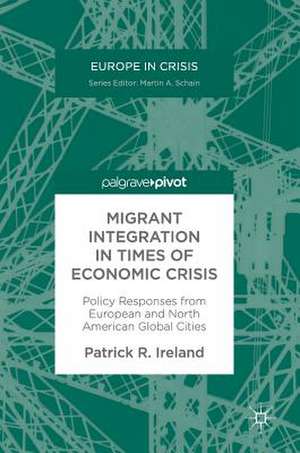Migrant Integration in Times of Economic Crisis: Policy Responses from European and North American Global Cities: Europe in Crisis
Autor Patrick R. Irelanden Limba Engleză Hardback – 11 aug 2017
| Toate formatele și edițiile | Preț | Express |
|---|---|---|
| Paperback (1) | 410.94 lei 6-8 săpt. | |
| Springer International Publishing – 12 mai 2018 | 410.94 lei 6-8 săpt. | |
| Hardback (1) | 416.92 lei 6-8 săpt. | |
| Springer International Publishing – 11 aug 2017 | 416.92 lei 6-8 săpt. |
Preț: 416.92 lei
Nou
Puncte Express: 625
Preț estimativ în valută:
79.78€ • 82.43$ • 66.37£
79.78€ • 82.43$ • 66.37£
Carte tipărită la comandă
Livrare economică 19 martie-02 aprilie
Preluare comenzi: 021 569.72.76
Specificații
ISBN-13: 9783319580999
ISBN-10: 331958099X
Pagini: 119
Ilustrații: XVI, 117 p.
Dimensiuni: 148 x 210 mm
Greutate: 0.31 kg
Ediția:1st ed. 2017
Editura: Springer International Publishing
Colecția Palgrave Macmillan
Seria Europe in Crisis
Locul publicării:Cham, Switzerland
ISBN-10: 331958099X
Pagini: 119
Ilustrații: XVI, 117 p.
Dimensiuni: 148 x 210 mm
Greutate: 0.31 kg
Ediția:1st ed. 2017
Editura: Springer International Publishing
Colecția Palgrave Macmillan
Seria Europe in Crisis
Locul publicării:Cham, Switzerland
Cuprins
Introduction.- Integration, Polarization, and Segregation in the Global City.- Methods.- The Global City Cases.- Conclusions.
Notă biografică
Patrick R. Ireland is Professor of Political Science at the Illinois Institute of Technology in Chicago, USA. He has written extensively on urban-level migrant integration in Europe, North America, and Africa; female migrant domestic workers; and migrant health. His publications include The Policy Challenge of Ethnic Diversity (1994) and Becoming Europe: Immigration, Integration, and the Welfare State (2004), as well as many peer-reviewed journal articles and book chapters.
Textul de pe ultima copertă
This book examines how the severe economic downturn following the 2007-2008 financial crisis affected the structural integration and quality of life of urban migrants in Europe and North America. It compares the experiences of migrants from Poland, Romania, Serbia, Pakistan, and Ghana in five similar, secondary global cities of Hamburg (Germany), Barcelona (Spain), Chicago (USA), Toronto (Ontario, Canada), and Montréal (Québec, Canada) over the period of 2000-2015. The work uses statistical analysis to gauge changes in residential segregation and structural integration (such as unemployment, poverty, and social assistance rates). It then provides qualitative analyses of individual city neighborhoods where the target migrant groups have settled, exploring each community's unique evolution and the ambivalent impact that local policy responses have had on their quality of life. With this study, researchers, instructors, students, and policymakers with an interest in migration, urban development, and global cities will be far more knowledgeable of both the potential and limits of policy efforts.
Caracteristici
Offers a timely examination of urban migrant integration and residential segregation patterns in the wake of the post-2008 global economic crisis Argues that the ongoing efforts of municipal governments to improve the segregation and structural integration of migrants have not been successful Utilizes mixed methods in comparing settlement patterns and integration levels of five national groups (Poles, Romanians, Serbs, Pakistanis, and Ghanaians) in five secondary, global cities (Barcelona, Chicago, Hamburg, Montréal, and Toronto) Includes supplementary material: sn.pub/extras Includes supplementary material: sn.pub/extras






